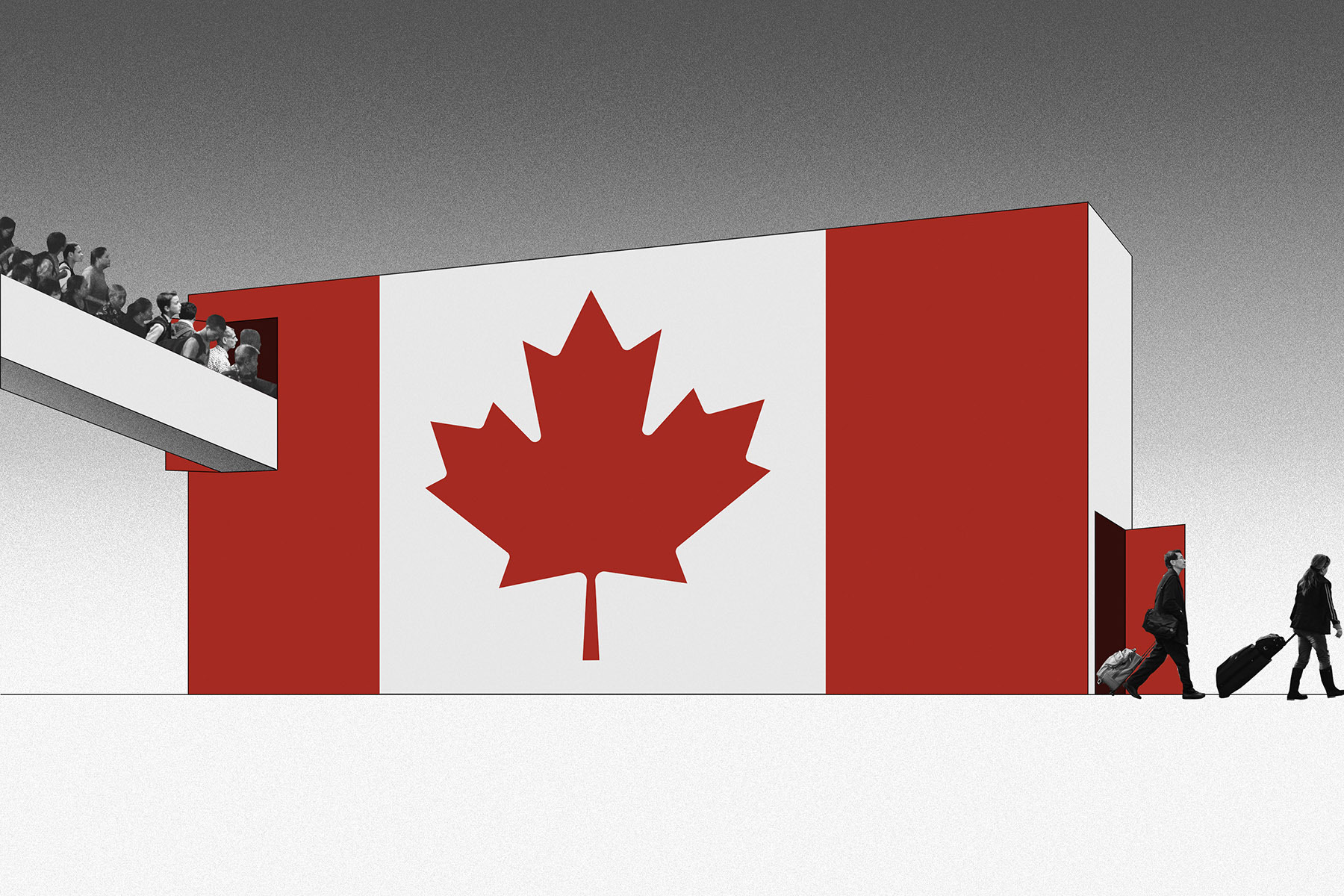Back in May 2019, then US president Donald Trump approached the podium in the Rose Garden at the White House and delivered what would turn out to be one of his more weirdly normal speeches. The topic was immigration reform, and it was weird precisely because it didn’t veer off into Trump’s usual race baiting—no rapist Mexicans or terrorist Arabs—though there was still plenty of fear mongering.
Trump railed against an immigration system that he said was too random, relying almost entirely on family-sponsored immigration—so-called chain migration—and visa lotteries, robbing America of the chance to recruit the world’s top talent. He noted with atypical accuracy that of the more than 1 million people who received lawful permanent resident status in the US, only 12 percent were “selected based on skill or based on merit” (according to the Office of Homeland Security, the figure was in fact 12.6 percent in 2018). In other countries, he added, specifically calling out Canada, the percentages were “closer to 60 and even 70 and 75 percent.”
He was right, mostly. That same year, in Canada, skills-based immigration accounted for 58 percent of all new permanent residents, based on Immigration, Refugees and Citizenship Canada statistics. For Trump, the solution to America’s immigration woes was simple: “Like Canada,” he said, “we create an easy-to-navigate points-based selection system. You will get more points for being a younger worker, meaning you will contribute more to our social safety net. You will get more points for having a valuable skill, an offer of employment, an advanced education, or a plan to create jobs.”
It was a carbon copy of the points-based immigration system Canada had set up in 1967, and it wasn’t the first time that system had been singled out for emulation. In the 1970s, Australia adopted its own ranking system for selecting immigrants, modelled on Canada’s; New Zealand followed in 1991; the UK in 2008. Most recently, Germany adopted a grading repertoire for potential newcomers, launching its own points system for skilled labour in June this year.
Unlike its predecessors, though, Trump’s plan failed to gain traction, possibly derailed by a divided Congress incapable of passing legislation or, later, by a pandemic that gifted anti-immigrant bigots in the US the closed borders they so desperately wanted, if only for a little while.
Then Trump lost the 2020 election.
Since then, President Joe Biden and the Democrats have done little to inspire confidence in their ability to solve America’s immigration puzzle. The past three years have been marked by more chaos at the border and stopgap policies designed to keep people out rather than tackling the reasons they are arriving—in record numbers—in the first place.
What we do know about the Democrats’ approach to immigration reform is that it’s not much different from Trump’s. In 2013, when Biden was vice president, four Democratic senators partnered with four Republicans to propose a bill that would have instituted their own version of a points-based immigration system. Congressional Republicans blocked the initiative, arguing that it didn’t go far enough to secure the southern border, despite funding that would have added nearly 20,000 new border patrol agents and plans to expand border fencing.
Given the apparent bipartisan support, it feels only inevitable that whenever—or if ever—the US drags itself out of its polarized political morass, it will catch up to the rest of the world, further tighten its borders, and institute a points-based immigration system.
From the Canadian perspective, that may not sound all that bad. Hasn’t Canada created one of the most harmonious multicultural societies in the world? Isn’t the key to making that possible its ability to control who comes in and who doesn’t?
But that truth has yet to set in. We still cling to the fiction of Canada the Good, Canada the humanitarian nation, welcoming of outsiders, a refuge for the world’s vulnerable where anyone can build a successful life. The reality, though, is that Canada has engineered its immigrant society through the careful selection of immigrants and refugees. It is not the land of open arms and goodwill; it is the land of gatekeepers and talent poachers.
Around the world, borders are getting a hard second look. In 2015, when 1.3 million people—most driven by war, persecution, and poverty—arrived at the borders of the European Union, the response was not to band together to fulfill western democracy’s commitments to international treaties and help those people find a new life; it was to lock down and turn inward. Border controls went up, along with funding for Frontex, the agency in charge of the EU’s border security. It has ballooned by nearly 600 percent since. That pattern is repeating itself elsewhere. Brexit was in large part a referendum on whether the UK should maintain some degree of open borders or harden them to give authorities more control over immigration.
In his 2022 book, Sorting Machines: The Reinvention of the Border in the 21st Century, macrosociologist Steffen Mau argues that borders are now best understood not as national boundaries but as systems designed to sort out wanted migrants from the unwanted. “[L]iberal states,” he writes, “reinforce the sorting function of borders, not least because they are looking for ways to circumvent their self-imposed liberal commitments and to expand their scope to prevent unwanted mobility.”
Some of those circumvented commitments include pledges to address the damage wealthy nations have done to the economies of colonized nations during the colonial era and to confront the environmental degradation stemming from industrialization—both of those things, research shows, are key drivers of migration. Instead, they have chosen to follow Canada’s lead: take advantage of a world in crisis to poach talent, perpetuating the colonial-era practice of stripping vulnerable nations of their resources—in this case, human resources.
The cynicism is confounding. Migration experts like Mau say wealthy nations bear the responsibility of collectively finding a solution to the growing number of refugees in the world today. Those numbers may sound terrifying—37.6 million people, practically the entire population of Canada, officially registered with the UNHCR, the UN agency responsible for finding a permanent solution for them. But in reality, they represent only a small fraction of the total population of developed nations. It’s not a failure due to scale, as only about 1 percent of all refugees are ever resettled in any given year. It’s a failure of moral courage driven by jaundiced self-interest.
In Istanbul last year, a medical officer with the UN agency working on refugees and immigration told me Canada is setting the tone for how the world is responding to this crisis. “It is one of the most selective countries in the world,” he said, requesting anonymity because he was not authorized to talk to the media. “Canada prioritizes young families, preferably with young children, people who will put the least pressure on its social security system and provide maximum economic benefit.”
The same selectivity that governs Canada’s immigration system is now being applied to asylum, the medical officer told me. Canadian officials are leaning more heavily on private sponsorship while steadily reducing the number of government-assisted refugees, who are selected for resettlement by the UNHCR. But in a new study published in the Journal of Immigrant and Refugee Studies, private sponsorship in Canada has now succumbed to what its authors call the “naming principle.” Under the current system, groups of private citizens as well as community groups and designated organizations called Sponsorship Agreement Holders (SAHs) can choose individuals or families they wish to sponsor. The private group or organization is then responsible for helping the sponsored refugees settle into their community and for providing financial support to them for one year.
It all sounds wonderful on the surface—until you apply the naming principle and look more closely at who is selected for sponsorship. According to the head of one non-profit organization in Canada, that depends on the priorities of the private group or organization. “In the case of a private sponsorship, it often ends up being a family member or friend of someone in the sponsorship group,” the person said, requesting anonymity. “In the case of an SAH, it could be a contact. It’s not as methodical as it could be in terms of filtering for vulnerability over other variables. It’s based on networks of contacts and relationships rather than everyone having equitable access to the opportunity.”
Vulnerability, though, is supposed to be the guiding principle for the asylum system. The UNHCR’s own Resettlement Handbook emphasizes vulnerability—not integration potential—as the priority when selecting refugees for resettlement. “For example,” the handbook says, “educational level or other factors considered to be enhancing the prospects for integration are not determining factors when submitting cases for resettlement.”
The sponsorship program inherently selects out people who possess “factors considered to be enhancing the prospects for integration.” Canadian officials identified this weakness in 2013 and introduced the Blended Visa Office-Referred category, or BVOR, to offset the imbalance. Under the BVOR, private groups are incentivized to sponsor refugees who are selected for them by the UNHCR based on vulnerability. In return, the government of Canada will cover half the cost of caring for the refugees.
Sadly, the BVOR has found few takers. Last year, BVOR-sponsored refugees represented only 0.2 percent of all those resettled in Canada. When given a choice between helping a person familiar to us and a total stranger, we will gravitate to who we know; it’s human nature. This is why having impartial processes in place to evaluate asylum claims based on vulnerability are so crucial to maintaining the humanitarian goals of the international asylum system. Otherwise, we drift toward a Hunger Games version of asylum policy, minus the fights to the death, though Trump has openly toyed with that idea too.
Canada is, perhaps unwittingly, leading the world into that dystopian future. In 2016, the Canadian government set up the Global Refugee Sponsorship Initiative to promote the private sponsorship model. By 2018, five countries—the UK, Ireland, Argentina, Spain, and New Zealand—had launched pilot sponsorship programs, with Germany joining not long after.
Other programs, too, are now openly flouting vulnerability in favour of utility. In April 2018, for instance, the Canadian government launched the Economic Mobility Pathways Pilot program, specifically designed to target skilled refugees for resettlement to Canada.
The ethical quandaries are obvious. Conditions like war and environmental catastrophes, for which wealthy nations bear much of the responsibility, create push factors that force people to flee their homes to seek refuge and a better life somewhere else. The vast majority of these people end up in refugee camps or on the streets of poor transit countries where they wait for wealthy nations to decide if they are worth saving. Those wealthy nations are now setting up sorting systems designed to filter out the most useful people while condemning the rest to destitution—using Canada as a model.
But this isn’t about ethics alone. The utilitarian turn we’re experiencing today is symptomatic of a broader deterioration of the safeguards that have kept global disorder at bay. Extreme selectivity in immigration and asylum leaves millions of desperate people without a solution to their desperate circumstances, destabilizing the places where they find themselves trapped in transit and forcing those host countries to then resort to measures that further break down the rules-based international order.
We’re already witnessing some of the consequences: Turkey, Pakistan, and Iran have deported hundreds of thousands of Afghan refugees back to Taliban-controlled Afghanistan. The 54,000 or so Afghans whom Canada has admitted since the Taliban takeover in August 2021 are a mere drop in that vast ocean of suffering. Inside Canada, meanwhile, selectivity in immigration has produced a massive market for seedy immigration consultants and recruiters who exploit desperate people around the world, promising them a future in Canada but often at a steep price.
Fixing the problem won’t be easy. Wealthy nations need to cooperate and coordinate to share the burden of caring for the unwanted. Canada can set an example. It can cancel its Safe Third Country Agreement with the US, allowing asylum seekers arriving from the south to receive all the rights they are guaranteed under international law. It can take the emphasis off economic immigration and focus instead on humanitarianism. It can balance out the points system with a lottery program. It can reduce private sponsorship numbers in favour of government-assisted resettlement, and it can relaunch the BVOR as the primary form of private sponsorship.
It may sound idealistic, perhaps even naive, but something is seriously wrong when a person like Trump says he wants to be more like you. Authoritarians want more walls; they relish disorder and the transactionalism that comes with it. It serves their interests. It might be time to rethink ours.





